|
|
|
Sort Order |
|
|
|
Items / Page
|
|
|
|
|
|
|
| Srl | Item |
| 1 |
ID:
116229
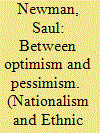

|
|
|
|
|
| Publication |
2012.
|
| Summary/Abstract |
The Oslo Accords failed to end Israeli-Palestinian violence and led to a final settlement of the conflict. This article examines Israeli attitudes toward conflict resolution and argues that the peace process, despite its setbacks, has increased Israeli support for certain concessions. While support for the "Oslo Process" may have declined, Jewish Israeli acceptance of the creation of a Palestinian state has risen dramatically. Israelis remain committed to continuing the peace process, they just remain highly skeptical that the process will succeed. The article examines the sources of this skepticism. Both lack of trust in Arab aspirations and religiosity are the primary determinants of Israeli unwillingness to make concessions for peace. Trust is tied to present conditions rather than past conditions of conflict. Thus, if trust could be rebuilt, Israeli Jews would be considerably better poised to make political and territorial concessions for peace than they were at the start of the "Oslo Process." Although the relative fertility rates of Orthodox Jews, compared to secular Jews, might undermine long-term support for peace, this might be counterbalanced by the growing dovishness of young secular Russians socialized in Israel.
|
|
|
|
|
|
|
|
|
|
|
|
|
|
|
|
| 2 |
ID:
181223


|
|
|
|
|
| Summary/Abstract |
The architects of the Oslo process, at both the academic and intelligence levels, used the faulty ‘New Middle East’ paradigm to posit that the Palestinians were ripe for peacemaking. They ignored the considerable strength of the Islamists who, controlled by the Iranian regime, were deployed as peace spoilers. More than two decades after the collapse of the 2000 Camp David summit, the role of the Iranians has not been fully understood, leading most observers to assume that the Hamas and Palestinian Islamic Jihad are independent actors.
|
|
|
|
|
|
|
|
|
|
|
|
|
|
|
|
| 3 |
ID:
116186
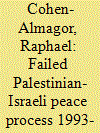

|
|
|
|
|
| Publication |
2012.
|
| Summary/Abstract |
This article examines the major developments that have taken place since the signing of the Oslo accords in September 1993. It analyses the major mistakes made along the way by both sides, showing that brinkmanship is a very dangerous policy when one or both sides are willing to pay a high price in blood. Finally, it offers a blueprint for breaking the deadlock roughly based on the Clinton parameters of 2001 and the subsequent Israeli-Palestinian Geneva Accords.
|
|
|
|
|
|
|
|
|
|
|
|
|
|
|
|
| 4 |
ID:
094515
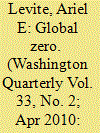

|
|
|
| 5 |
ID:
190986
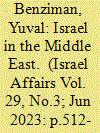

|
|
|
|
|
| Summary/Abstract |
During its 75 years of existence, Israel’s strategies vis-à-vis its neighbours have alternated drastically in accordance with the vicissitudes in regional and global affairs: from reliance on force, to a status quo approach, to combining ‘land-for-peace’ approach while participating in ‘new wars’, to peace initiation, to unilateral action, to improved relations with the Arab world while trying to avoid the Palestinian issue. This article describes the evolution of these strategies, discusses their origin and underlying assumptions, and assesses their future implications.
|
|
|
|
|
|
|
|
|
|
|
|
|
|
|
|
| 6 |
ID:
091731


|
|
|
| 7 |
ID:
131109
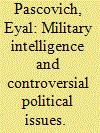

|
|
|
|
|
| Publication |
2014.
|
| Summary/Abstract |
Contrary to intelligence services in other democracies worldwide, the activity of the Israeli Directorate of Military Intelligence, AMAN, is not merely centered around collection and research regarding military intelligence matters. Instead, AMAN covers the majority of intelligence activity arenas, including intelligence regarding state-related issues. This field of activity presents a situation where AMAN's officers, and predominantly, its research division, are compelled to deal with sensitive issues embedded well within Israeli political and public controversy. This is commonly illustrated in the field of 'Intelligence for Peace' in general and more specifically in the Palestinian arena. Intelligence research surrounding the question of Palestinian commitment to peace throughout the Oslo Process and following the onset of the al Aqsa Intifada - activity classified as 'Intelligence on Intentions' - placed AMAM at the heart of political debate in Israel and resulted in bitter internal disagreements in AMAN as well as tensions between the intelligence service and the political leadership. Throughout the years, numerous recommendations have been repeatedly voiced to end AMAN's monopoly over Israel's national intelligence assessment (including aspects of intelligence regarding state-related issues). These recommendations were based predominantly on hindsight evaluations, such as AMAN's repeated failures in intelligence assessments. This paper calls for gradual termination of AMAN's activity of intelligence regarding state-related issues, in light of its contradiction with the appropriate military-political separation in a democratic society. Moreover, it places AMAN at the heart of the political debate dividing Israeli society.
|
|
|
|
|
|
|
|
|
|
|
|
|
|
|
|
| 8 |
ID:
192895


|
|
|
|
|
| Summary/Abstract |
Thirty years after its euphoric launch, the ‘Oslo peace process’ between Israel and the PLO stands as the worst calamity to have afflicted Israelis and Palestinians since the 1948 war, and the most catastrophic strategic blunder in Israel’s history. By replacing Israel’s control of the West Bank and Gaza Palestinians with corrupt and repressive terrorist entities that indoctrinated their subjects with burning hatred of Jews and Israelis, as well as murdered some 2,000 Israelis and rained thousands of rockets and missiles on their population centres, the Oslo process has made the prospects for peace and reconciliation ever more remote. By deflating the combative ethos of the Israel Defence Forces (IDF), it has weakened Israel’s national security and made the outbreak of a multi-front war a distinct possibility. By transforming the PLO (and, to a lesser extent, Hamas) into internationally accepted political actors without forcing them to shed their genocidal commitment to the Jewish state’s destruction, it weakened Israel’s international standing. And by deepening Israel’s internal cleavages and destabilising its sociopolitical system, it has created a clear and present danger to the Jewish State’s thriving democracy, indeed to its very existence.
|
|
|
|
|
|
|
|
|
|
|
|
|
|
|
|
| 9 |
ID:
161217
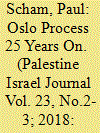

|
|
|
|
|
| Summary/Abstract |
Although I live in Washington, DC, less than 3 miles from the White House lawn, on September 13, 1993 I watched the signing ceremony of the Oslo Accords from Jerusalem. I took a tiny bit of ownership in watching the peace process succeeding (as I thought then) before my eyes, as I had set up the first DC office of Americans for Peace Now in 1989 and had spent a year and a half lobbying for peace — in those pre-Oslo days when even Peace Now was afraid to openly support two states. I had little doubt that — as many friends put it — “we won” and, except for inevitable bumps on the road, Israeli-Palestinian peace was (almost) assured. Later that evening, I saw groups of Palestinians mingling with Israelis around the “seam” line, some carrying PLO flags that had been strictly illegal until then.
|
|
|
|
|
|
|
|
|
|
|
|
|
|
|
|
| 10 |
ID:
048637


|
|
|
|
|
| Publication |
Abu Dhabi, Emirates Center for Strategic Studies and Research, 1998.
|
| Description |
82p.
|
| Series |
Emirates Occasional papers; 24
|
|
|
|
|
|
|
|
|
|
|
|
Copies: C:2/I:0,R:0,Q:0
Circulation
| Accession# | Call# | Current Location | Status | Policy | Location |
| 040351 | 330.95694/ROY 040351 | Main | On Shelf | General | |
| D40351 | 330.95694/ROY D40351 | Main | On Shelf | General | |
|
|
|
|
| 11 |
ID:
174259
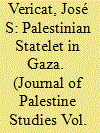

|
|
|
|
|
| Summary/Abstract |
Fatah leaders routinely accuse Hamas of plotting to establish an “emirate” in the Gaza Strip. Gaza is in fact turning into a statelet separate from the West Bank, but it is Israeli policies that are driving the “Gaza is Palestine” option with a series of measures that have been implemented since the early 1990s to sever Gaza from the West Bank. This development has intensified under the administration of U.S. president Donald Trump. In the White House's vision for Middle East peace, which turns the West Bank into a series of isolated Bantustans enveloped by Israeli territory and shorn of Jerusalem, the Gaza Strip becomes the centerpiece of any future Palestinian entity. The international community, laser focused on avoiding another war in Gaza, has prioritized the humanitarian over the political crisis, furthering the excision of the Palestinian territory. As aid flows directly into Gaza, bypassing Ramallah, and Israel and Hamas negotiate a long-term ceasefire, the Palestinian Authority (PA) finds itself increasingly marginalized.
|
|
|
|
|
|
|
|
|
|
|
|
|
|
|
|
| 12 |
ID:
108521
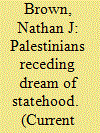

|
|
|
| 13 |
ID:
065947
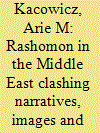

|
|
|
|
|
|
|
|